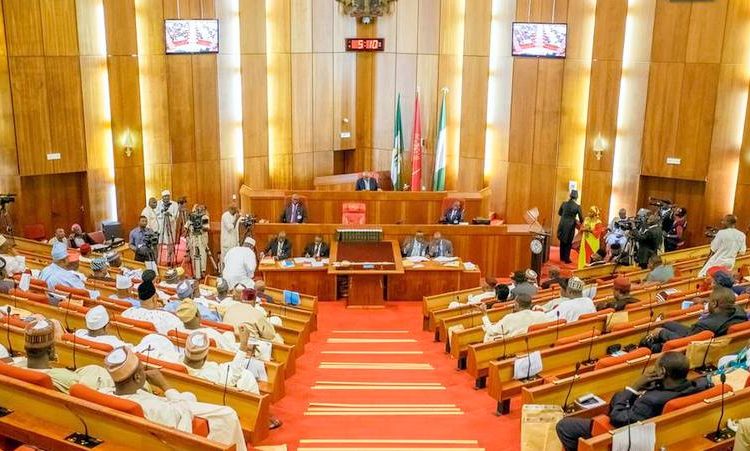Labour Unions in Nigeria headed by the Nigeria Labour Congress (NLC) said they will shut down all the 36 State Houses of Assembly over plans not to pass Local Government Autonomy bill.
The labour unions said they will not backtrack on their threat until local government autonomy, state assembly autonomy, judicial autonomy bills are passed as part of the 44 bills the National Assembly transmitted to the State Houses of Assembly.
This is coming just as the National Assembly has said that the State Houses of Assembly have sent four fresh bills for passage with a condition that they would not continue working on the 44 bills earlier sent to them by the National Assembly, including the local government autonomy bill, unless the federal lawmakers treated them.
On March 29, 2022, the Clerk to the National Assembly, Amos Ojo, transmitted 44 bills passed by the Senate and House of Representatives on March 1 to the State Houses of Assembly.
Since then, there seems to have been not much progress on the constitution amendment bills.
LEADERSHIP exclusively reported earlier how the local government autonomy bill was heading to a dead end.
But speaking when they met with the chairmen of the Constitution Amendment Committee yesterday at the National Assembly, the NLC said they will ensure they shut down all the State Houses of Assembly until the local government autonomy bill is passed.
NLC president Comrade Ayuba Wabba said the union had observed that some people were arm-twisting the whole constitution amendment process.
“The position of the NLC about state police was very clear. We don’t want it. Boko Haram started with political thuggery. If a state governor can deploy thugs against an opposition in a rally, it means that the same governors will do worse if state police is granted to them. We are a Nigerian organisation; we don’t want state police. There are some state governors that have not paid salaries for 18 months, including not paying medical doctors,” he said, adding that the union will not compromise on local government autonomy.
“On the local government’s autonomy, we want it. We have stated clearly that we need LG autonomy. We need an independent institution to stand. If we have only strong people, we can’t stand.
“We will start mobilising. We want local government autonomy. We will be ready to commence a process to ensure that the autonomy of local government, judiciary, and state assembly stand. We will shut down all the state houses of assemblies,” Wabba said.
Also, the president, Nigerian Union of Local Government Employees (NULGE), Olatunji Ambali, said that the union was unhappy at the level of insecurity and poverty in the country, adding that it will resist any attempt to reject the local government’s autonomy.
“It is an attempt to blackmail the National Assembly over the local government autonomy,” Ambali said of the four bills sent to the National Assembly to pass as a condition for the passage of the local government autonomy.
“For us, we are ready to engage them. They are delaying the passage of the constitution amendment because of local government autonomy. Those governors opposed to local government autonomy are the ones oppose to the State Assembly autonomy. Some of them are using impunity to hijack the local governments revenues.
“We are not fighting for local government autonomy because of salaries. It’s not about salary, it’s not about workers’ welfare, it’s about patriotism. We want Nigeria to work. Any candidate who doesn’t want local government autonomy, Nigerians should vote them out.”
On his part, the national president, Parliamentary Staff Association of Nigeria (PASAN), Comrade Mohammed Usman, said the labour union had earlier shut down the 36 state assemblies demanding local government autonomy adding that the country is bigger than any individual.
“The governors are just 36. If we can shut down the state assemblies, we can do that again because of local government autonomy,” he said.
But speaking at a briefing, the chairman, Constitution Amendment Committee in the Senate, Senator Ovie Omo-Agege, who is also the Deputy Senate President, said the state houses of assembly had sent four bills to them for passage as a condition for them to continue with the constitution amendment process.
Omo-Agege, who lamented what is happening in the states, said members of the National Assembly may not even be able go home for fear of the governors.
“They can use these state police to stop our colleagues from campaigning at home. They have not done a lot to justify why there should be state police,” Omo-Agege said of the reasons why they rejected state police bill.
On the new threat from the state houses of assembly, in which they are requesting the National Assembly to pass the four new bills before they can continue with the constitution amendment process, Omo-Agege said the threat came after the vote on the 44 bills had been taken.
Omo-Agege, whose statement was jointly signed by the deputy Speaker of the House of Representatives, Idris Wase, said: “We did not refuse to consider state police. We considered it, and it was voted out. You need two-thirds to pass it. They got only four votes. We are not in contention with the House of Representatives. This is a joint statement from the two leadership. We sat down and took a position,” Omo-Agege said, adding that they have had interaction with the speakers of the state houses of assembly who, he said, are not opposed to Local Government autonomy.
“The 44 bills transmitted to the State Houses of Assembly seek to, amongst others: strengthen the legislature’s authority to enable it to serve as an effective pillar of checks and balances to the executive; strengthen independent constitutional bodies; create and strengthen a culture of good governance; address issues of revenue leakages and unbridled government spending, and enhance effective administration of justice in Nigeria.
“Regarding the 44 bills, 25 State Houses of Assembly have yet to consider and vote on these bills. So far, only Abia, Akwa-Ibom, Anambra, Delta, Edo, Kaduna, Katsina, Kogi, Lagos, Ogun and Osun states have successfully considered, voted on, and forwarded their resolutions on the 44 bills to the National Assembly.
“More worrisome is that while we are still expecting the receipt of the resolutions of the remaining Houses of Assembly, we received a letter from the Conference of Speakers of State Assemblies informing the National Assembly that the remaining states will not act on the 44 Bills unless the National Assembly passes four new Bills they have proposed in the letter. The Bills they propose seek to amend the Constitution to: establish state police; establish State Judicial Council; streamline the procedure for removing presiding officers of state houses of assembly; and institutionalise Legislative Bureaucracy in the Constitution,” Omo-Agege said.
He clarified that the National Assembly was not opposed to acting on any proposed Bill or memoranda appropriately tabled before it, at any time in its life but that it was wrong for the Conference of Speakers to use the four Bills as a tradeoff to act on the 44 Bills the National Assembly transmitted to them.
“It is clear, and we cannot overstate it, that this letter is not in keeping with the obligation the Constitution has placed on them regarding the Constitutional amendment.
“Let us be clear, the Bills the National Assembly transmitted to the State Houses of Assembly as required by the Constitution are not about members of the National Assembly; they transcend our personal and political interests. It is about the people who have graciously given us the temporary privilege to serve them. The offices and positions we each hold belong to the people. And they yearn for a government that is honest, accountable, and responsive to their needs.”
He added that it was, therefore, disheartening that some State Houses of Assembly, through the Conference of Speakers, would give the National Assembly conditions before fulfilling their constitutional obligations.











